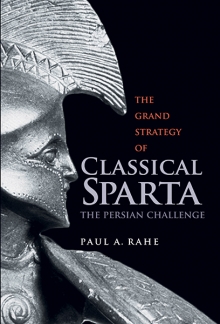
Available Fall 2016: The Spartan Regime: Its Character, Origins, and Grand Strategy (Yale Library of Military History)
An authoritative and refreshingly original consideration of the government and culture of ancient Sparta and her place in Greek history
For centuries, ancient Sparta has been glorified in song, fiction, and popular art. Yet the true nature of a civilization described as a combination of democracy and oligarchy by Aristotle, considered an ideal of liberty in the ages of Machiavelli and Rousseau, and viewed as a forerunner of the modern totalitarian state by many twentieth-century scholars has long remained a mystery. In a bold new approach to historical study, noted historian Paul Rahe attempts to unravel the Spartan riddle by deploying the regime-oriented political science of the ancient Greeks, pioneered by Herodotus, Thucydides, Plato, Xenophon, and Polybius, in order to provide a more coherent picture of government, art, culture, and daily life in Lacedaemon than has previously appeared in print, and to explore the grand strategy the Spartans devised before the arrival of the Persians in the Aegean.
Available from Amazon.com, Yale University Press, and bookshops everywhere.
The Grand Strategy of Classical Sparta
More than 2500 years ago a confederation of small Greek city-states defeated the invading armies of Persia, the most powerful empire in the world. In this meticulously researched study, Dr. Rahe argues that Sparta was responsible for the initial establishment of the Hellenic defensive coalition and was, in fact, the most essential player in its ultimate victory.
Drawing from an impressive range of ancient sources, including Herodotus and Plutarch, the author veers from the traditional Atheno-centric view of the Greco-Persian Wars to examine from a Spartan perspective the grand strategy that halted the Persian juggernaut. Rahe provides a fascinating, detailed picture of life in Sparta circa 480 B.C., revealing how the Spartans’ form of government and the regimen to which they subjected themselves instilled within them the pride, confidence, discipline, and discernment necessary to forge an alliance that would stand firm against a great empire, driven by religious fervor, that held sway over two-fifths of the human race.
The Grand Strategy of Classical Sparta is available from Amazon.com, Yale University Press, and fine booksellers everywhere.
Dr. Paul Rahe appears on National Review Online's "Uncommon Knowledge"
Dr. Rahe joined Hoover Institution Fellow and host of National Review Online's Uncommon Knowledge" video series Peter Robinson to defends his position that President Obama’s health-care proposals “presuppose the administrative state’s assuming a power over our lives that is nothing less than tyrannical." Watch the entire series here...
Montesquieu and the Logic of Liberty
Montesquieu and the Logic of Liberty. A companion volume to Soft Despotism, Democracy's Drift, Paul Rahe's Montesquieu & The Logic of Liberty examines the reasons for Montesquieu’s early fame, arguing that his reputation is deserved and worthy of close attention today. Read more...Soft Despotism, Democracy's Drift
In the last century, in Europe and in the United States, soft despotism—the gentle tyranny of the majority—has been democracy’s drift. But what has been, Paul Rahe argues, and what will be need not be the same. If we come to a proper understanding of the causes of the present discontents, we can set a new course for the democracies today. To achieve such an understanding, Rahe argues in Soft Despotism, Democracy’s Drift: Montesquieu, Rousseau, Tocqueville, and the Modern Prospect, we must re-examine the character of modern, commercial republicanism.Dr. Paul A. Rahe is a noted historian of political philosophy, Professor of History and Political Science at Hillsdale College and author of the renowned study Republics Ancient and Modern: Classical Republicanism and the American Revolution.
